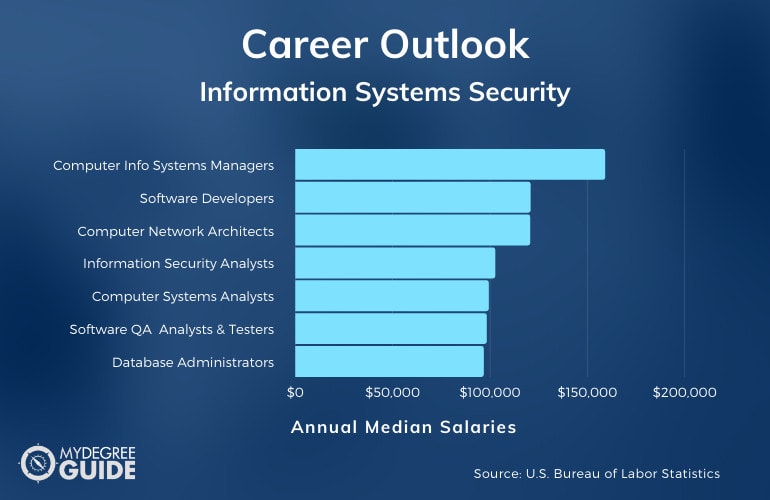If you’re interested in solving intricate computer problems and safeguarding businesses from potential fraud and theft, then you might consider an information security analysts degree.

Effective professionals in information system security are proficient in problem-solving, communication, and analytical thinking.
Editorial Listing ShortCode:
Information security analysts are the first line of defense against cybercrime. They create the passwords and security protocols that try to prevent issues such as fraud, identity theft, and even cyberbullying and harassment.
Universities Offering Online Bachelors in Information Security Degree Program
Methodology: The following school list is in alphabetical order. To be included, a college or university must be regionally accredited and offer degree programs online or in a hybrid format.
Arizona State University
Arizona State University’s Bachelor of Arts in Information Security program aims to teach students the fundamentals of protecting, organizing, and administering secure information. These skills are broadly applicable across many fields and business sectors. This 120 credit program is housed entirely online and consists of 40 classes. Each class is 7.5 weeks long.
Arizona State University is accredited by the Higher Learning Commission.
Champlain College
The online Bachelor of Science in Computer and Information Systems program at Champlain College aims to provide graduates with the skills needed to excel in a variety of technical roles. This is a uniquely friendly program for students completing their general requirements elsewhere. Students with qualifying credits can transfer in up to 90 of the program’s 120 required credits from outside institutions.
Champlain College is accredited by the New England Commission of Higher Education.
Colorado Technical University
Colorado Technical University offers an online program for a Bachelor of Science in Information Technology. Graduates of the program often pursue positions in programming, network management, system administration, cloud computing, and IT system development. This 120 credit program includes interdisciplinary studies in computer science, engineering, and information technology.
Colorado Technical University is accredited by the Higher Learning Commission.
Dakota State University
Dakota State University offers a Bachelor of Science in Network and Security Administration. The program features fully equipped virtual and physical labs, providing hands-on experience for both in-person and online attendees. Courses cover concepts such as database management, networking, operating environments, computer forensics, routing and switching, and defensive and offensive network security.
Dakota State University is accredited by the Higher Learning Commission.
Drexel University
The online Bachelor of Science in Computer and Security Technology program aims to prepare students for network and cyber security roles in corporate, government, and non-profit sectors. Graduates often become chief information security officers, IT security engineers, and forensic computer analysts.
Drexel University is accredited by the Middle States Commission on Higher Education.
Kennesaw State University
Kennesaw State University offers a Bachelor of Business Administration with a major in Information Security and Assurance. The curriculum incorporates foundational technological, leadership, and business concepts to prepare students for professional business sectors. After completing the general education requirements, students can typically complete program-specific requirements in 2 years.
Kennesaw State University is accredited by the Southern Association of Colleges and Schools Commission on Colleges.
Liberty University
Liberty University offers a Bachelor of Science in Information Technology in Data Networking and Security. This program is designed for students hoping to move into leadership and support roles within the field of information technology. This 120 credit, 100% online program features courses that are 8 weeks long. Most students can complete the program in 3.5 years.
Liberty University is accredited by the Southern Association of Colleges and Schools Commission on Colleges.
Park University
The Bachelor of Science in Information Systems at Park University offers the flexibility of attending fully online or at one of several nationwide campuses. The program features courses in discrete mathematics, web programming, python programming, data management, business applications, computer systems analysis, and more.
Park University is accredited by the Higher Learning Commission.
University of Illinois – Springfield
The University of Illinois—Springfield offers a Bachelor of Science in Information Systems Security. The program boasts expert faculty, flexible online courses, and instruction in cutting edge technologies and principles. The curriculum teaches how to design, build, and manage systems security, maintain ethical professional best practices, and communicate this essential knowledge.
UIS is accredited by the Higher Learning Commission.
Western Governors University
Western Governors University offers a program for a Bachelor of Science in Online Cybersecurity and Information Assurance. With the growing reliance on technology and increasing issues with cyber criminals, viruses, and scams, it aims to equip graduates for a variety of vital technological security roles. This 120 credit program is designed to meet the professional guidelines set within the field.
Western Governors University is accredited by the Northwest Commission on Colleges and Universities.
Online Information Security Analysts Degrees

Information security analysts excel at creating computer software that prevents unauthorized individuals from stealing or altering proprietary data. Professionals in this field can work for a wide range of industries, as most everyone needs information protection. They might work for the government, a business, a medical office, or a telecommunications firm.
Some of the protections you can create aim to prevent infiltrators from accessing the system. Others can help you identify and contain breeches once they occur. You may even work alongside computer forensic experts if a crime is committed and data is lost.
Information security professionals typically need to hold a bachelor’s degree in cybersecurity or a related field. To conclude your degree plan, some universities require the completion of a capstone project or an internship. Here are some of the course topics you might study while earning your degree:
- Cybersecurity principles
- Ethical hacking
- Cyber law
- Malware analysis
- Programming languages
- Information networks
- Security information and management
With the growing demand for computer security experts, earning a college degree can open up a wide variety of professional opportunities for you.
Some graduates go on to design computer networks, while others turn their efforts to writing security code as programmers. You might even choose to analyze computer data as a network analyst. There are many applications for this multifaceted degree.
Information Systems Security Careers & Salaries

Wherever there’s sensitive personal and proprietary information in a digital format, there’s potential for security breaches. As a result, information security personnel are needed in every industry. According to the Bureau of Labor Statistics, here are some of the career paths and salary data associated with information systems security.
| Careers | Annual Median Salaries |
| Computer Information Systems Managers | $159,010 |
| Software Developers | $120,730 |
| Computer Network Architects | $120,520 |
| Information Security Analysts | $102,600 |
| Computer Systems Analysts | $99,270 |
| Software Quality Assurance Analysts and Testers | $98,220 |
| Database Administrators | $96,710 |
| Computer Programmers | $93,000 |
| Network and Computer Systems Administrators | $80,600 |
| Computer Network Support Specialists | $62,760 |
Your exact role, job duties, and level of responsibility can differ based on your educational background, chosen industry, and prior experience.
Some graduates find work in brick-and-mortar organizations, such as banks, stores, or hospitals. Other computer security professionals specialize in e-commerce or government. Experienced analysts may eventually move into management, supervising or training other individuals.
Bachelor of Information Security Curriculum & Courses

The coursework for an online cyber security bachelor’s degree differs from school to school. Here are some of the potential courses that you might come across:
- Systems Risk Assessment: In this course, you’ll learn how to identify spots in a computer system that might be vulnerable to cybercrime.
- Network Security: Your professors will show you how to anticipate and defend against network attacks.
- Database Management: You’ll learn how to maintain databases and defend them from attack strategies.
- Principles of Digital Forensics: You’ll learn how to respond when you encounter suspicious activity or find evidence of cybercrime.
- Information Age Ethics: This course will teach you the ethical standards that all computer personnel must uphold while working online.
- Ethical Hacking: In this course, you’ll learn how to test your organization’s security protocols to ensure they can withstand a digital attack.
- Introduction to Programming: It’s necessary for computer security experts to have firm command of several computer languages.
- Virtualization and Cloud Security: This course will show you how to set up computer security in a virtual environment.
- Concepts in Cryptography: In this class, you’ll learn how to design connections that allow two-way secure communication.
- Technical Writing: You’ll be trained to discuss computer security issues in formal business writing.
You might also follow up your classes with a capstone project.
How to Become an Information Security Analyst

Security analysts are responsible for keeping a company’s digital assets safe from hackers. The skill set required for this job is highly specialized and requires advanced training and hands-on experience.
Here are some common steps you can follow if you want to pursue a career as an information system security expert:
- Earn a computer science degree. An information security career often requires professionals to have an undergraduate degree in a computer-related field. For instance, you could pursue a programming degree or a bachelor’s degree in cybersecurity.
- Gain professional experience. Many job openings in cybersecurity require applicants to have practical work experience in the field. It is possible for you to get experience while in school by participating in an internship program.
- Get certified. If you are just starting out in the cybersecurity field, getting professional cybersecurity certifications could better demonstrate your capabilities to potential employers.
- Develop a professional network. You are more likely to find employment if you network with other security professionals. Having professional references could help you stand out in a crowd.
There are many different kinds of professional certification programs for a beginning information security analyst. You can specialize in ethical hacking, information security management, or security essentials. You may qualify for additional certifications as you gain experience.
Admissions Requirements

Here are typical admission requirements for bachelor programs in cybersecurity:
- Letters of recommendation. Admissions personnel may ask you to provide recommendation letters from teachers, mentors, or employers.
- Personal essay. You may be required to write an entrance essay that includes your interests and professional goals.
- School transcripts. Most schools will require a minimum GPA of their choosing.
While not all universities require SAT or ACT scores, many still do. You can check with your admissions counselor to discover a school’s specific criteria.
Accreditation

Accreditation boards regularly review schools for quality of instruction and academic rigor. There are many benefits to enrolling at a university that has earned regional accreditation. For instance, students that attend an accredited school typically have an easier time transferring their credits to other schools.
In addition, many financial aid programs will only provide funding for accredited university programs. Employers also recognize and often prefer educational credentials that were earned at an accredited school.
Information Security Majors Financial Aid and Scholarships

A college education can be costly, but there are many funding sources out there for students who qualify.
- Student loans. The federal government offers loans for undergraduates. While they must be paid back, they often have a low interest rate.
- Grants. Federal grants are given to students who qualify based on financial need.
- Scholarships. These are typically offered by schools and outside organizations for a variety of reasons, such as academic merit, athletics, and area of study.
- Work-study programs. The federal government can connect qualifying students with part-time work through their school or a local business.
You can apply for federal aid by filling out a FAFSA form.
What Does an Information Security Analyst Do?

Many information security analysts are tasked with safeguarding an organization’s computer systems from cyberattack. To this end, they can design, inspect, and test security protocols for their company or client.
Information security analysts might also instruct other company personnel on how to communicate sensitive information safely while online. In addition, they can create response plans to be implemented in the event of a breach, and they may help computer forensic teams in their investigations of cyber crimes.
What Can You Do with an Information Security Bachelor’s Degree?

Professionals with bachelor in information security degrees may have opportunities to work in many different types of organizations. These can include private businesses, government agencies, hospitals, and financial institutions.
Here are some possible job titles related to this field:
- Computer network architect
- Information security analyst
- Software developer
- Network administrator
Workers in this field may set up computer security networks or oversee their daily operations. Those in leadership roles manage others performing these functions.
It may be worth looking into the on-campus and online master’s in information security programs that a growing number of universities now offer.
How Long Does It Take to Become an Information Security Analyst?

A typical bachelors degree in information security or cybersecurity requires around 120 credits. If you go to school full-time, you can generally complete a bachelors in 4 years.
If your degree program requires a capstone project or internship, this may extend your graduation timeline. You may also wish to complete a certification program to enhance your resume and qualification. Some programs offer specialization options that are designed to prepare you for professional certification in the field.
Online degree programs, including online cyber operations degree programs, are also known for their flexibility. Some offer accelerated tracks to help you finish sooner, while others offer part-time studies to let you go at your own pace.
What’s the Difference Between a Bachelor’s Degree in Information Security vs. Cyber Security?
The difference between information security and cyber security is subtle, so it’s easy to confuse the two.
| Information Security | Cyber Security |
|
|
The primary difference lies in what activities are being secured by the efforts of the professional in charge. All in all, cyber security is a specialized subset within information security. Information security deals with all data, while a cyber security analyst specifically deals with digital data.
Is a Bachelor in Information Security Degree Worth It?

Yes, a bachelor in information security degree is worth it for many students. All modern organizations depend on digital data for daily recordkeeping and operations, so information and cyber security experts are in very high demand.
According to the Bureau of Labor Statistics, job opportunities for information security analysts are projected to grow by 33% over the next ten years, which is much faster than the national average. Other related career —including computer systems managers, software developers, and database administrators and architects—are also expected to have positive job growth.
This is a flexible degree, and the expertise and skill sets you develop may help you qualify to work in a variety of roles and organizations.
Getting Your Bachelor’s in Information Security Degree Online

Earning a bachelors in information security can help you enter this swiftly growing, highly marketable career. Many programs are also designed to prepare you for industry certifications.
Getting your degree online is a flexible option that could help you better balance your studies with work and other life responsibilities. Your chances of getting a job in this field after college could improve if you have work experience and references from professional colleagues.
If you think this IT field is right for you, you can start exploring accredited universities today to find the information security program that’s the best match for your needs and goals.
